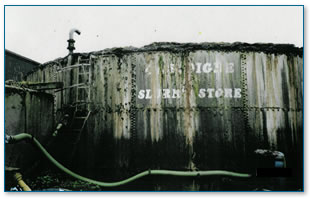organic
waste
Organic waste is produced on farms whether they
rear livestock or grow crops. Organic waste includes such materials
as plants and animal dung (W07d). If organic
waste gets into streams and rivers it can cause serious problems.
The process that involves the rotting or breaking
down of waste organic materials is known as decomposition and it
can lead to the pollution of water if it is not handled correctly.
This is called organic pollution.
• Decomposition: Organic waste is decomposed
(broken down) by bacteria (G1)
and a large amount of oxygen is used in the process, sometimes faster
than it can be replaced. If there is not enough oxygen decomposition
slows down and poisonous substances build up. The rate at which
oxygen declines is known as ‘biological oxygen demand’.
The organic waste is demanding oxygen to help it decompose and by
doing this it is taking oxygen away from living organisms which,
like humans, rely on oxygen to survive.
• Slurry: On dairy farms there is a lot
of manure and urine from the cows (slurry) and dirty water (W07e)
from washing cows, yards and buildings. This has to be disposed
of or stored safely. Slurry is usually stored in slurry lagoons
or slurry tanks. On some farms slurry and dirty water is reused
as fertiliser for growing crops (W07b),
but farmers have to take care that the slurry does not leak and
run into watercourses where it can cause pollution.
 |
Slurry Store |
• Silage: Livestock farmers use silage
(W07f) to feed their stock in the winter
in place of or as well as hay. Sometimes they make their own silage
from grass and other green crops. Silage is stored in silage clamps.
Farmers have to ensure that liquid does not leak out of silage clamps
and run into gullies or ditches that lead to the river.
Organic pollution danger spots on farms include:
Manure heaps (W07d)
Silage clamps (W07f)
Slurry lagoons (W07d)
|

